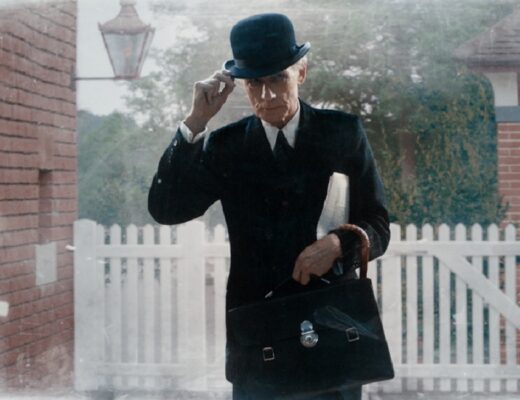At the height of the pandemic, one of the more uplifting trends on social media were videos of people living in cities, clanging pots and pans en masse in appreciation of first responders and other medical professionals who ventured out into a potentially dangerous and uncertain world while many of us were telecommuting from home in our pajamas. In its own sadistic way, Jean-Stéphane Sauvaire’s Asphalt City also views itself as a tribute to emergency workers, specifically paramedics who in the film’s telling venture into an urban hellscape every day to bring people back from the brink of death, although it’s hard to imagine anyone leaving the film feeling especially hopeful. A dour, punishing, almost plot-free account of two paramedics — one at the beginning of his career, the other a hollowed-out husk after decades on the job — working out of New York’s East Side and losing a little piece of their soul every time they step into the breach. The characters contend, on a daily basis, with the absolute dregs of humanity for little pay and no gratitude while bringing home the sort of spiritual baggage that can destroy everything good in their lives. The film is an endurance test, a ceaseless wallow in the name of experiential filmmaking where, after two hours of depicting unspeakable suffering, it slaps some statistics about the number of EMTs who have committed suicide in the past few years over the end credits alongside platitudes about them being our “guardian angels.” It’s not enough for us to appreciate a thankless job; as presented by Sauvaire, it’s as though we need to go through the motions of a passion play to understand it.
Based on Shannon Burke’s 2008 novel Black Flies, Asphalt City throws us into the action during one of rookie EMT Ollie Cross’ (Tye Sheridan) first shifts. Arriving at low-income housing (most of the calls the character takes over the course of the film are to places like this), Cross is immediately overwhelmed by the sheer amount of blood at the scene of a gangland shooting, unsure where to direct his attention and drawing the ire of his short-tempered partner (Michael C. Pitt, at his most punchable), who views the younger man as a useless hump. In either an act of supreme patience or masochism, Cross is taken under the wing of a more experienced EMT, Gene Rutkovsky (Sean Penn), a humorless lifer burning the candle at both ends. And so begins a nightly odyssey into death and despair, following the men on calls ranging from rousting drunken vagrants from local businesses to reviving ungrateful addicts to shuffling the dying and gravely ill to the hospital where success is often measured in the few minutes a patient is resuscitated before eventually expiring. While Cross views the job as a layover, a means of garnering practical experience while he studies to take the MCAT, Rutkovsky has no such escape, and perhaps even resents his new partner for aspiring for something better than this endless purgatory. Bit by bit the older man’s increasingly pessimistic perspective on life creeps into their interactions with their patients: what’s the point of saving someone if it means living in a world devoid of salvation? And is there even a cruelty in interceding in someone’s life if it’s only to return them to a forlorn existence?
Cheerful stuff, no? And it’s not as though the home lives of the two men offers much of a reprieve. Rutkovsky has a young daughter with his most recent ex-wife (Katherine Waterston), who doesn’t let him in the front door until he hands over back rent and is threatening to relocate the family upstate to live with her new boyfriend. Cross splits his time between living out of a spartan rented bedroom in Chinatown and heading uptown to have increasingly violent sex with a single mother he met at a club (Raquel Nave, playing less a character and more a means for the film to insert ample nudity into the film, with the actress spending all of her scenes silently lounging in bed with Sheridan). It’s unclear exactly what either man is getting out of the work (surely it can’t be the money), though, not for nothing, Sheridan’s character spends his off-hours wearing a jacket with angel wings embroidered on the back. The film treats being a paramedic as a higher calling — it’s as if they’re playing God, only without the accompanying ego rush — however, unlike, say, the priesthood, moments of grace or deliverance are few and far between. Like Sisyphus and his boulder, Cross and Rutkovsky are doomed to carry out the same spirit-crushing ritual seemingly for eternity, as ultimately helpless to save others as they are themselves.
In its setting, episodic structure, heightened squalor, and even use of the flashing red dome lights of an ambulance as visual punctuation, the film superficially recalls Martin Scorsese and Paul Schrader’s Bringing Out the Dead. Nobody’s idea of an especially cheerful film, Bringing Out the Dead at least benefited from a pitch-black sense of humor and an ability to skilfully navigate between theoretically incongruous tones. There are few jokes in Asphalt City — when Cross and Rutkovsky briefly trade lame “dad jokes” while driving through the city, it only emphasizes how little actual levity there is in the film — although at a certain point the only way to maintain one’s sanity at the parade of agony is to openly laugh at it. We witness a Pit Bull being executed point blank, an elderly man suffering shortness of breath in an abattoir, a lifeless and blood-covered infant born to a drug-addicted, HIV-positive mother, and a body found in a bathtub, all but translucent from weeks of decomposition (which naturally reminds Cross of his suicidal mother, whose body he discovered when he was younger). In that sense, what Asphalt City really resembles are the films of Alejandro González Iñárritu, particularly earlier works like Biutiful and 21 Grams (which coincidentally also starred Penn). Like Iñárritu, Sauvaire equates unrelenting misery with integrity; we can’t know the toll that the job takes on decent men like Cross and Rutkovsky unless the film shoves our face in it until we’re all but gasping for air. Asphalt City is a crass bludgeon that doesn’t so much end on a hopeful note, but rather on an exhausted acknowledgement that if you do this work for long enough you’re bound to encounter somebody who will thank you for it.
DIRECTOR: Jean-Stéphane Sauvaire; CAST: Tye Sheridan, Sean Penn, Katherine Waterston, Michael Pitt, Mike Tyson; DISTRIBUTOR: Roadside Attractions/Vertical; IN THEATERS: March 29; RUNTIME: 2 hr. 5 min.







